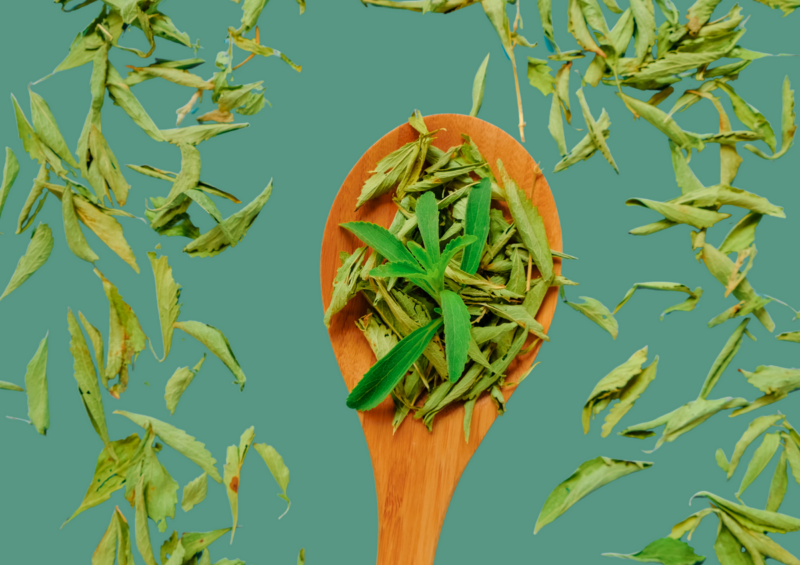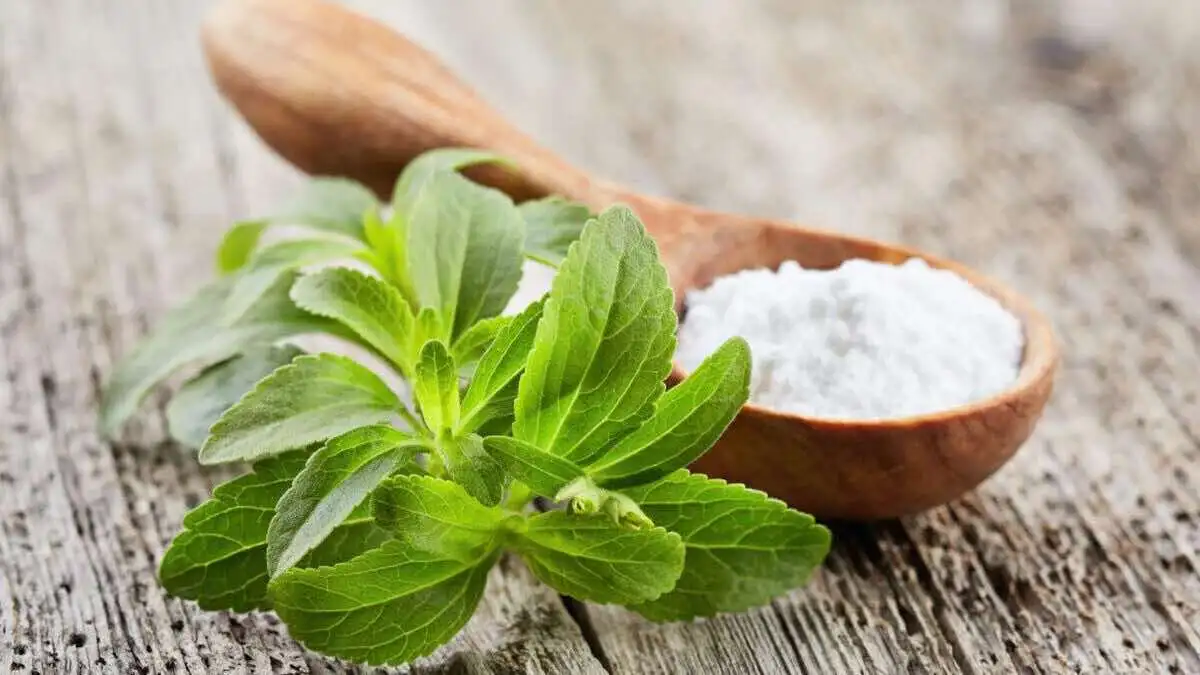Baking with coconut sugar has grown in popularity, but it’s not the only sweet option available.
In fact, several healthy coconut sugar substitutes can work just as well in your favorite recipes.
Now, I want to talk about some of the best options you can choose out there.
1. Stevia

Stevia is a zero-calorie sweetener derived from the leaves of the Stevia rebaudiana plant, which is native to parts of South America.
The leaves of the stevia plant contain Stevie glycosides, which are intense natural sweeteners that can be 200-300 times sweeter than regular sugar.
Stevia has been used as a sweetener in Paraguay and Brazil for centuries, and it has gained popularity worldwide in recent decades as a healthier alternative to sugar and artificial sweeteners.
It is calorie-free and has a low glycemic index, making it an attractive option for people watching their sugar and carb intake, such as those with diabetes.
Some people may experience side effects like bloating, nausea, or headaches when consuming large amounts of stevia.
There is also ongoing debate about the safety of long-term stevia consumption, particularly regarding its potential impact on the gut microbiome.
When using stevia as a sugar substitute in baking, it’s important to keep in mind that stevia is much sweeter than sugar, so you’ll need to use significantly less.
A good rule of thumb is to use:
1/4 to 1/2 teaspoon of stevia per 1 cup of sugar
Stevia also lacks the bulk and texture of sugar, so it’s often combined with other low-calorie sweeteners or small amounts of regular sugar to achieve the desired consistency in baked goods.
2. Erythritol
Erythritol is a sugar alcohol that occurs naturally in some fermented foods, such as:
- Wine
- Beer
- Cheese
- Soy sauce
It is produced commercially by fermenting glucose with a yeast called Moniliella pollinis.
Erythritol has a similar sweetness to sugar, but it contains 0 calories and 0 net carbs, making it a popular sugar substitute for low-carb and keto diets.
One of the main benefits of erythritol is that it does not raise blood sugar or insulin levels, making it a suitable sweetener for people with diabetes.
Erythritol is also absorbed differently than other sugar alcohols, with most of it being absorbed in the small intestine and excreted unchanged through urine, rather than reaching the large intestine and causing gastrointestinal issues.
Some may experience mild side effects like digestive discomfort or headaches when consuming large amounts of erythritol.
When substituting erythritol for sugar in baking, you’ll need to use about 1.5 times the amount of erythritol compared to the amount of sugar called for in the recipe.
Erythritol may also have a slight cooling effect, so you may need to adjust other ingredients or cooking times to achieve the desired texture and flavor.
3. Xylitol
Xylitol is a sugar alcohol that is found naturally in various fruits and vegetables, including:
- Berries
- Plums
- Corn
- Birch trees
Xylitol has a similar sweetness to sugar, but it contains about 40% fewer calories and has a lower glycemic index.
One of the primary benefits of xylitol is its ability to reduce the risk of tooth decay and promote oral health.
Xylitol inhibits the growth of the bacteria that cause cavities, and it can also help remineralize tooth enamel.
Additionally, xylitol has been shown to have anti-inflammatory properties and may help regulate blood sugar levels.
However, consuming large amounts of xylitol can cause gastrointestinal issues like bloating, gas, and diarrhea in some people.
When substituting xylitol for sugar in baking, you can generally use a 1:1 ratio, as xylitol has a similar sweetness to sugar.
It’s also important to note that xylitol is toxic to dogs, so any baked goods containing xylitol should be kept away from pets.
4. Maple Syrup
Maple syrup is a natural sweetener derived from the sap of maple trees, primarily from:
- Sugar maple (Acer saccharum)
- Black maple (Acer nigrum)
The sap is collected, boiled, and concentrated to produce the thick, golden-brown syrup.
Maple syrup has a rich, complex flavor that is often described as having notes of caramel, vanilla, and even hints of nuts or spices.
Compared to refined sugar, maple syrup contains a higher concentration of:
- Plant Compounds
- Antioxidants
- Phenols
- Minerals:
- Zinc
- Manganese
Studies have suggested that maple syrup may have anti-inflammatory, anti-cancer, and anti-diabetic properties.
Maple syrup is still a calorie-dense sweetener, so it should be consumed in moderation as part of a balanced diet.
Overconsumption of maple syrup can lead to weight gain and other health issues.
When substituting maple syrup for sugar in baking, you’ll typically need to use about 3/4 cup of maple syrup for every 1 cup of sugar called for in the recipe.
5. Honey
Honey is a sweet, viscous liquid produced by honeybees from the nectar of flowers.
The composition and flavor of honey can vary depending on the floral sources the bees visit, as well as the geographical region and climate where it is produced.
Honey has been used as a sweetener and natural remedy for thousands of years, with evidence of its use dating back to ancient civilizations in Egypt, Greece, and China.
Honey is often touted as a healthier alternative to refined sugar due to its antioxidant content, antimicrobial properties, and potential health benefits.
It is still a calorie-dense sweetener, and overconsumption can lead to weight gain and other health issues.
It’s also important to note that honey should not be given to infants under one year of age due to the risk of botulism.
When substituting honey for sugar in baking, you’ll typically need to use about 3/4 cup of honey for every 1 cup of sugar called for in the recipe.
You may also need to reduce the amount of other liquid ingredients, as honey has a higher moisture content than sugar.
6. Date Sugar
Date sugar is a minimally processed sweetener made from dried, ground dates.
It is produced by dehydrating and grinding whole dates, resulting in a coarse, brown sugar-like powder.
Date sugar has been used for centuries in Middle Eastern and Mediterranean cuisines, where dates are a staple fruit.
Compared to refined sugar, date sugar is minimally processed and retains more of the natural nutrients and antioxidants found in dates, such as:
- Fiber
- Potassium
- Polyphenols
It also has a lower glycemic index, making it a potentially healthier option for those watching their blood sugar levels.
Date sugar is still a calorie-dense sweetener and should be consumed in moderation as part of a balanced diet.
Some people may experience digestive issues or allergic reactions when consuming large amounts of date sugar

